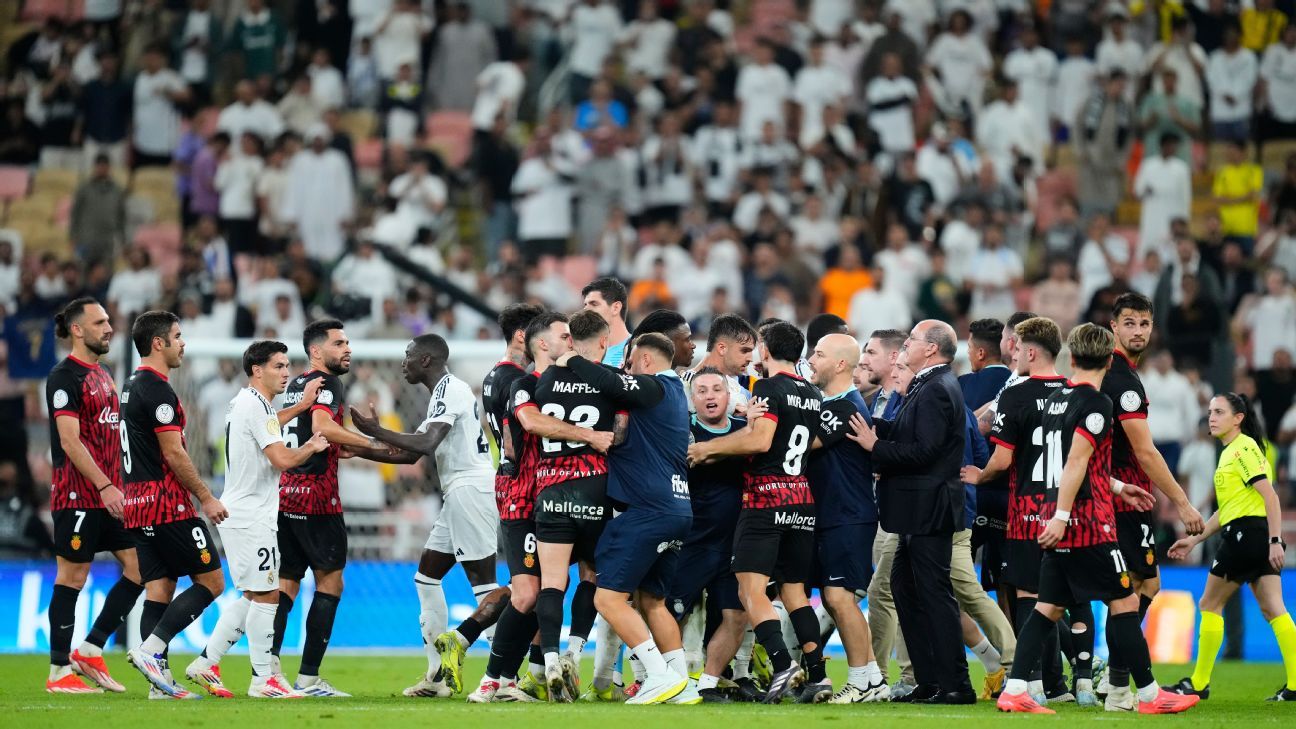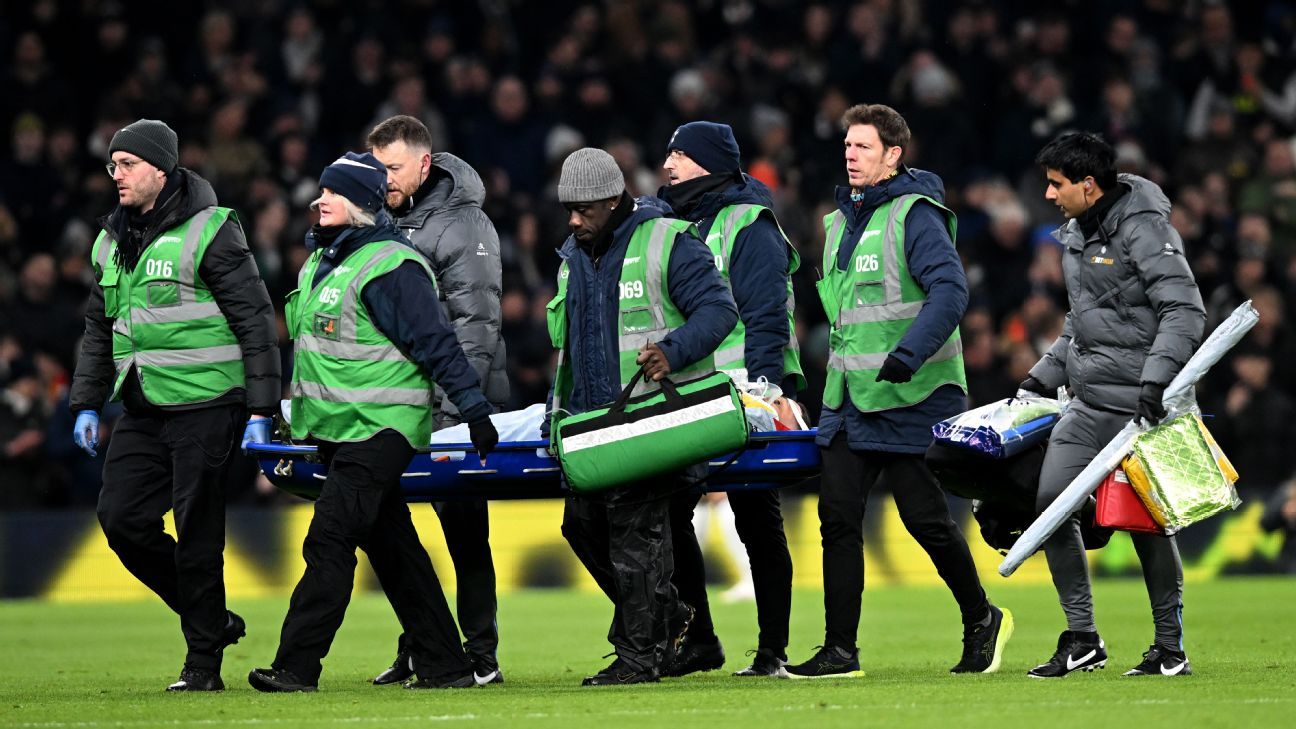
Tim Vickery, South America correspondentJul 3, 2024, 08:02 PM
Two late goals helped Argentina to a 3-0 win over Ecuador in the quarterfinals of the last Copa América, but the scoreline did not reflect the match.
Physically strong, quick and with plenty of talent, Ecuador gave Argentina an uncomfortable 90 minutes, as the victorious coach was quick to acknowledge. After the match, Argentina manager Lionel Scaloni paid tribute to the promise of the new Ecuadorian generation.
Three years down the line, Scaloni will be wary of meeting them once more at the quarterfinal stage. Argentina are in by far the easiest half of the draw. The team that most threatens their path to the final is the side they meet on Thursday in Houston -- as long as Ecuador can raise their game.
The Ecuadorian group phase in this Copa is best forgotten. Beaten 2-1 by Venezuela, they played a scrappy second half and made hard work of a 3-1 win over Jamaica, but the goal they scored in the 90th minute proved vital. It gave them a goal difference advantage over Mexico. A draw would have been enough to seal their place in the last eight. And grimly and joylessly, Ecuador went about the task of keeping the game goalless.
The strategy flirted with disaster when the Mexicans were awarded a penalty in the last minute of stoppage time, but VAR had a look, and correctly overturned the decision. Ecuador survived to fight another day, and now have a shot against the reigning world champions.
Why was their group phase so underwhelming?
They had to dig themselves out of a hole after captain and all-time top scorer Enner Valencia received a straight red card early in the game against Venezuela. Playing with ten men for over 70 minutes in the afternoon heat of Santa Clara proved too much, and the campaign got off to a losing start. These things can happen in tournaments. But there are deeper problems.
One is the atmosphere in which the team are playing. After the World Cup, Ecuador appointed Felix Sanchez as their new coach. There was some logic in the choice. A Spaniard, Sanchez has a background in the Barcelona youth ranks, and then spent time in Qatar's Aspire academy -- where the methodology is very similar to that used in Independiente del Valle, the extraordinary little club from the outskirts of Quito that is producing so many players for the Ecuador national team.
His time in charge of Qatar was not a flop -- he won the Asian championship. But the World Cup was not a success. The host's campaign began with a defeat to Ecuador. And so why, thought many of the Ecuadorian public, are we appointing a loser to take charge of our team?
Ecuador can be a very demanding environment. And although the team's start to the 2026 World Cup qualifiers has been solid -- 3 wins, 2 draws and one defeat -- the quality of play has not been deemed good enough. Many want Sanchez out. Some were openly hoping for failure in the Copa, forcing the Ecuadorian FA to make a change. That pressure has not gone away.
Those six rounds of World Cup qualifiers have brought just five goals. Here, Sanchez can offer an excuse. He has at his disposal a number of good and promising players, most of them products of Independiente del Valle. The group of young centre-backs is impressive -- William Pacho has had an excellent Copa so far. But there is a dearth of resources up front.
Ecuador are dependent for goals on Valencia. The one time Premier League striker has always blown hot and cold, and he was also over-played in 2022-23, having a fine league season in Turkey either side of a good World Cup, and then going straight to the over-cluttered calendar of Brazilian football. At the age of 34, it is hardly surprising that this has taken a toll.
And the other centre-forwards are willing runners, but some way short of top quality. For this tournament there is the added blow of the absence through injury of Brighton's Pervis Estupiñán, a key player with his powerful runs from fullback and his blistering left foot.
1:06
Why Argentina are still favourites even without Messi
Ale Moreno and Herc Gomez discuss Argentina's style of play without Lionel Messi and why they're still favourites to win the Copa América.
Sanchez has hardly helped himself in this competition. His team selections have certainly been open to question. The task of a coach is to build a collective structure that gets the best out of the team's individual talents, and this he has so far been unable to do. The key man, the motor of the team, is Chelsea's Moisés Caicedo. He has tried mightily to make the team work, but he has too much ground to cover.
Caicedo has been operating as part of a central midfield duo, when three are needed in there to get the best out of him. With extra protection behind him, Caicedo can use his lung power running forward, creating problems for the opposing defence and linking the side together.
The base formation Sanchez has used is 4-2-3-1, allowing him a line behind the striker of a winger on the right plus both of his young playmakers, Jeremy Sarmiento on the left and 17 year old wonderkid Kendry Páez in the middle. This has not worked, although both have had moments. Sarmiento, though, has not been quick enough to combine with his teammates, and Paez has been squeezed in a zone of the field where the marking is tightest. As a consequence, the whole of Ecuador is adding up to less than the sum of its parts.
There would seem to be a solution, though. At half time in their match against Mexico, Venezuela switched from an ineffective 4-2-3-1 to add the extra man in central midfield. They started to take control, and went on to win the game. It was strange that Ecuador did not follow suit.
Instead, Sanchez dropped a winger against the Mexicans, played an extra striker and pushed Sarmiento and Paez out to the flanks -- where they were too far apart to combine, and with everything stretched out, Caicedo was unable to join the parts together. But Ecuador -- and Sanchez -- are still alive in the competition to have another chance at finding the right blend. The logical step would be to play three in the centre of midfield -- competing with Argentina where they are strongest -- field one quick winger and leave one of Paez and Sarmiento on the bench.
Another way to pack the midfield would be with a back three -- a formation that Sanchez likes, and which he used less than a month ago in a warm up friendly against Argentina in Chicago. The problem there was the absence of strikers. Paez and Sarmiento formed the front line. With no physical presence alongside them, they were unable to hold on to the ball and Ecuador could not get out of their own half. On this occasion Argentina's victory was far more convincing than the meagre 1-0 scoreline.
But after an hour Valencia came off the bench and the team switched to a 4-3-2-1. Suddenly, it was a different game. Ecuador could advance down the field and the surging runs of Valencia worried the Argentina defense.
If Ecuador can reproduce something like that, then there is a slight chance of an upset, and the threat exists of Argentina being unable to defend their Copa América title.
 (1).png)
 6 months ago
14
6 months ago
14


















